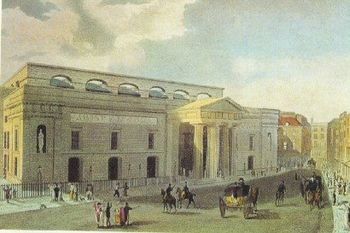Theatre Royal, Covent Garden: Difference between revisions
No edit summary |
No edit summary |
||
| Line 4: | Line 4: | ||
Fires were a common problem with theatres - the lighting in side both on stage and for the audience combined with the draperies, was hazardous. Fires usually started by accident<ref>[http://homepages.ihug.co.nz/~awoodley/illus/theatre.html]</ref> | The theatres were lit mostly by candlelight reflected from many chandeliers. Of course, these were not dimmed as the entertainment began, so you could well see everyone in the audience as well as the actors on stage. And they could see you! So what activities you engaged in while in your box had to be discreet. The use of candlelight (until replaced with gaslights) also posed a fire hazard, as evidenced by several of the theatres burning down.<ref>[http://thebeaumonde.com/the-theaters-of-regency-london-by-regan-walker/ The theatres of Regency London]</ref> Fires were a common problem with theatres - the lighting in side both on stage and for the audience combined with the draperies, was hazardous. Fires usually started by accident<ref>[http://homepages.ihug.co.nz/~awoodley/illus/theatre.html Theatre Royal]</ref>. | ||
Revision as of 11:18, 5 January 2017

There has been a theatre on this site since 1728. The theatre in 1811 was the second theatre on the site, as the first was burnt down on the 20th September 1808. Rebuilding began in December 1808 and the new theatre, to a design by Robert Smirke, was opened in September 1809 with the first performance on the 18th September being Macbeth, followed by a musical entertainment called The Quaker.
The theatres were lit mostly by candlelight reflected from many chandeliers. Of course, these were not dimmed as the entertainment began, so you could well see everyone in the audience as well as the actors on stage. And they could see you! So what activities you engaged in while in your box had to be discreet. The use of candlelight (until replaced with gaslights) also posed a fire hazard, as evidenced by several of the theatres burning down.[1] Fires were a common problem with theatres - the lighting in side both on stage and for the audience combined with the draperies, was hazardous. Fires usually started by accident[2].
The Theatre Royal was one of only two theatres in London in 1811 which held patents allowing them to put on performances of dramas (the other being the Theatre Royal, Drury Lane). The types of performance given were not restricted to the generally serious and sophisticated; Joseph Grimaldi (the famous pantomime clown) performed at the Theatre Royal in 1806 in the work which was his greatest success, Harlequin and Mother Goose, a work which built on the Italian Commedia dell'Arte and was instrumental in introducing clowns in a form with which modern audiences are familiar.
Performances in 1811

Friday, June 14, 1811 - The Young Quaker (comedy)
Monday, June 17, 1811 - Pizarro (tragedy)
Tuesday, June 18, 1811 - Cato (tragedy)
Wednesday, June 19, 1811 - The School of Reform (comedy)
Thursday, June 20, 1811 - The Mountaineers
Friday, June 21, 1811 - The Beggar's Opera
Saturday, June 22, 1811 - All's Well that Ends Well
Tuesday, July 23, 1811 - Pizarro (tragedy)
Cast: Mr. Egerton (Ataliba); Mr. Young (Rolla); Miss Worgman (Fernando); Mr. Chapman (Orozembo); Mr. Murray (Hualpa); Mr. Barrymore (Pizarro); C. Kemble (Alonzo); Mr. Creswell (Las Casas); Mr. Davenport (Almagro); Mr. Hamerton (Davila); Mr. Atkins (Gonzalo); Mrs. Powell (Elvira). Partial cast list for Timour, the Tartar: Mr. Farley, Mr. Fawcett, Mr. Treby, Mr. Jefferies, Mr. Field, Mr. Bishop.
The Theatre in LL
Robert Vickery had an opera dancer, Valeria Raworth as his mistress until his engagement
Read More
Royal Opera House: The Second Theatre Theatre Regency World: Covent Garden Theatre
<references>